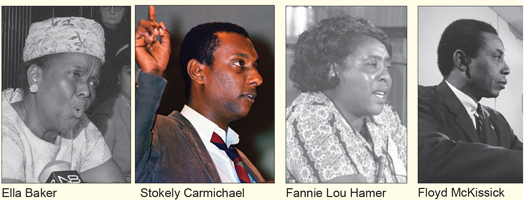Missing from movie, not from history - #Selma
By Askia Muhammad -Senior Editor- | Last updated: Jan 19, 2015 - 12:34:26 PMWhat's your opinion on this article?

|
WASHINGTON (FinalCall.com) - Even as critics of President Lyndon B. Johnson’s portrayal in the film “Selma” have complained that the President was far more sympathetic and was in fact enthusiastic about the confrontational Selma-to-Montgomery voting rights marches as a tactic to arouse public support for legislation in the U.S. Congress, they ignore the bitter and hostile rejection by the President, just seven months before, of Mississippi voting rights champion Fannie Lou Hamer who petitioned for representation of Blacks from that state at the 1964 Democratic National Convention in Atlantic City.
Mrs. Hamer participated in the historic Selma march, as did Student Non-Violent Coordinating Committee (SNCC) leader Stokely Carmichael, and other companions of Dr. King including Ella Baker and Floyd McKissick. They were however all written out of the Selma film. Also absent, was any mention of 1965 activists who made up the Lowndes County Alabama Black Panther (political) Party.
After two years of voting rights activism— activism which led to several arrests and one of the most brutal jailhouse beatings of any Civil Rights leader—Mrs. Hamer and others formed the mostly Black, Mississippi Freedom Democratic Party which challenged the all-White Democratic delegation for seats at the August 1964 convention.
President Johnson, afraid that any concession to the Mississippi Blacks would provoke a rebellion from the delegates from all the segregated Southern states, was adamant in his opposition to the Freedom Democrats. He ordered Minnesota Senator Hubert Humphrey—his first choice as his Vice Presidential running mate— and other prominent liberals to meet with Mrs. Hamer’s delegation and silence their protest
White Mississippi party members, the Freedom Democrats were offered two non-voting seats. The Freedom party refused the offer, and when Mrs. Hamer took their plight to the court of public opinion, testifying before the credentials committee—an event that was broadcast live on network television—Mr. Johnson hastily convened a press conference at the same time, to draw press coverage from Mrs. Hamer’s compelling story.
Mr. Carmichael, who one year after the Selma events popularized the phrase “Black Power,” was an important, charismatic leader of SNCC. He was a major organizer of the 1964 Mississippi Freedom Summer campaign, and was a companion of Dr. King, along with those who were depicted in the film and he was most certainly on the Edmund Pettus Bridge with Dr. King and others on March 9. Mr. Carmichael later changed his name to Kwame Ture.
“The politics of the film, the intent of the politics of the film were clear in the erasure of Stokely Carmichael, total erasure. The diminished capacity that is the role of Diane Nash and other women, the anti-SNCC perspective was just so clear,” Dr. Jared Ball, Associate Professor of Communications at Morgan State University told The Final Call. “John Lewis is a hero (in the movie), not just because of what he did but because he walked away from SNCC.”
The film, very skillfully diminishes the role of young Black militants who increasingly began to influence Dr. King in and after the events at Selma, in favor of the need for the movement to capitalize on a sense of White conscience and guilt, according to Dr. Ball.
Floyd McKissick was a North Carolina attorney who took over the leadership of the Congress of Racial Equality (CORE) a vital group in the Civil Rights leadership, in January 1965, who was also absent from the film Selma, likely because he turned CORE 180 degrees from its more accommodationist posture it had followed under leader James Farmer.
Ella Baker’s five decades long career in the Civil Rights movement found her working alongside the most famous leaders of the 20th Century, including Dr. King, A. Philip Randolph, Thurgood Marshall, Dr. W.E.B. DuBois, and she was a mentor to emerging activists Diane Nash (who was portrayed in “Selma”), Mr. Carmichael, Rosa Parks, and Bob Moses, who were not.
Mrs. Baker, who championed the phrase “participatory democracy,” was called “One of the most important African American leaders of the 20th Century, and perhaps the most influential woman in the Civil Rights Movement,” by Barbara Ransby in her book Ella Baker and the Black Freedom Movement.
The Black Panther Party of Lowndes County was organized in 1965 in the county which was 80 percent Black, with only two Black registered voters, to oppose the conventional Democrats. The largely illiterate population of Lowndes County was acquainted with the political parties by their symbols, a rooster for the White Democrats and a panther—likely taken from Prairie View A & M University or another HBCU team mascot—as the symbol for the Black candidates.
INSIDE STORIES AND REVIEWS
-
-
About Harriett ... and the Negro Hollywood Road Show
By Rabiah Muhammad, Guest Columnist » Full Story -
Skepticism greets Jay-Z, NFL talk of inspiring change
By Bryan 18X Crawford and Richard B. Muhammad The Final Call Newspaper @TheFinalCall » Full Story -
The painful problem of Black girls and suicide
By Charlene Muhammad -National Correspondent- » Full Story -
Exploitation of Innocence - Report: Perceptions, policies hurting Black girls
By Charlene Muhammad -National Correspondent- » Full Story -
Big Ballin: Big ideas fuel a father’s Big Baller Brand and brash business sense
By Bryan Crawford -Contributing Writer- » Full Story






 Click Here Stay Connected!
Click Here Stay Connected!








